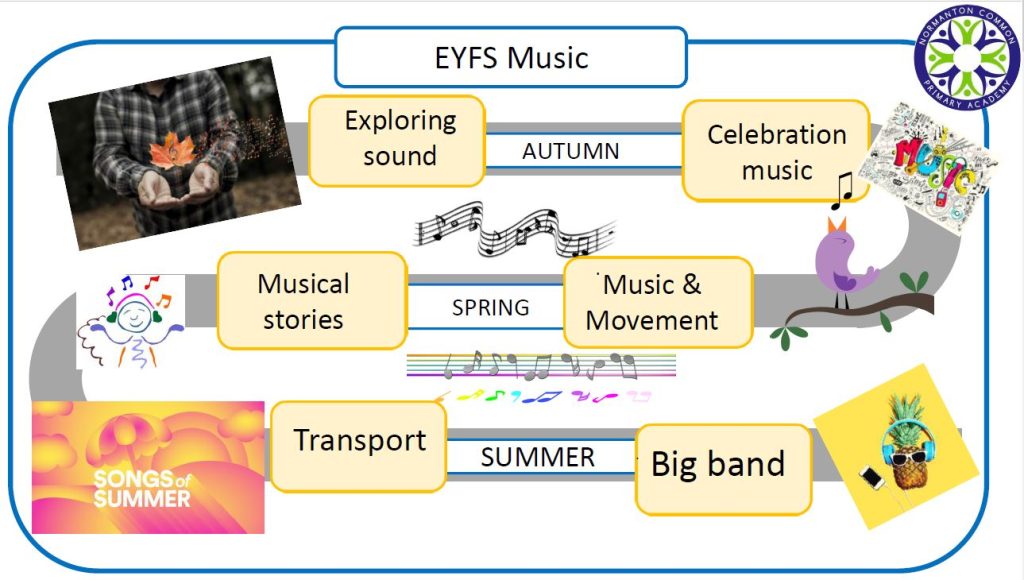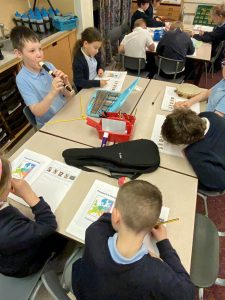Subject Leader : E Shuttleworth
‘Music enriches individual lives as well as a school’s wider community’
At Normanton Common, our pupils will learn that music is a universal language that embodies one of the highest forms of creativity. It is our intent that we make music an inspiring and enjoyable learning experience that will engage and encourage pupils to develop a love of music and develop their talent as musicians, and in turn increase their self-confidence, creativity and sense of achievement.
We believe that music plays an integral role in helping children to feel part of a community, therefore we provide opportunities for all children to create, play, perform and enjoy music both in class and to an audience. Through assemblies and performances, children showcase their talent and their understanding of performing with awareness of others. Lessons enable children to develop their skills, appreciate a wide variety of music and begin to appraise a range of musical genres. The music curriculum ensures students sing, listen, play, perform and evaluate. This is embedded in classroom activities as well as weekly singing assemblies, various concerts and performances, the learning of instruments, and the joining of musical ensembles.
In Music pupils will have the opportunity to:
- Enjoy and have an appreciation for music.
- Sing and use their voices individually and as a group.
- Create and compose music on their own and with others.
- Play a variety of instruments.
- Listen to, review and evaluate the work of great composers and musicians.
- Take part in performances.
How is the content / theme chosen?
The content is chosen to make effective links with key themes and ensure coverage of the expectations as set out in the National Curriculum programmes of study, as well as the EYFS framework. At Normanton Common Primary Academy we ensure a clear, sequenced progression, which is taught systematically for all pupils to acquire the intended knowledge and skills . The content may be adapted or changed, based upon the needs or interests of specific cohorts.
Click on the link below to see an overview of our Music Curriculum:

How is the subject taught?
The music curriculum ensures students sing, listen, play, perform and evaluate. This is embedded in the classroom activities as well as the weekly singing assemblies, various concerts and performances, the learning of instruments, and the joining of musical ensembles. The elements of music are taught in the classroom lessons so that children are able to use some of the language of music to dissect it, and understand how it is made, played, appreciated and analysed. In the classroom children learn how to play an instrument, from all four main instrument groups of wind, strings, percussion and keyboards. In doing so they learn to understand the different principles of each method of creating notes, as well as how to read basic music notation.
They also learn how to compose focussing on different dimensions of music, which in turn feeds their understanding when listening, playing, or analysing music. Composing or performing using body percussion and vocal sounds is also part of the curriculum, which develops the understanding of musical elements without the added complexity of an instrument. When children are learning about a subject through discrete teaching sessions they are explicitly told that today they are going to be ‘musicians.’ They are then reminded of the key skills that they will learn, use and develop within this subject.
In Music these are:
- to sing
- to listen
- to create
- to compose
- to play
- to perform
- to evaluate
Music is one of our key subject drivers in developing the ‘Challenge & Educate’ side of our school curriculum. Through studying a range of composers and musicians from a range of historical periods, genres, styles and traditions children learn about and are taught to challenge stereotypes connected to gender, wealth, disability and cultural background. They are educated that differences should be celebrated and are not a barrier to achievement.
Pupils also have additional opportunities to extend their music knowledge and skills through cross-curricular work. Strong links with other subject areas, particularly History and Art, ensure that children have numerous opportunities to apply skills across the curriculum. Opportunities to learn about significant people, including musicians and composers are carefully chosen, so that children are continually developing the sense of the importance of music in the wider world. This learning also strengthens the links between music, history and art.
Teaching Music in EYFS
Planning and teaching in EYFS is crucial to developing a life long love of music. Staff capture children’s interest and enthuasm by providing a range of carefully planned resources and activities that provoke and develop children’s musical skills. Through these activities, children are taught to discriminate between different sounds that instruments make and are given the vocabulary to talk about what they hear. They are taught to hear rhythms and clap beats in music using body percussion and percussion instruments. During the Early Years children learn a repertoire of songs that they can sing on their own or as part of a class.
The children are expected to develop a specific set of skills and knowledge appropriate to their age. This links to the expectations that are set out in the end of year Early Learning Goals, as we prepare our children with the knowledge and skills they will need in music, ready for year 1.
As well as the discrete teaching of music skills and knowledge, children in EYFS are given the opportunity to explore, investigate and continually practise their learning through the areas of provision set up in the indoor and outdoor learning environments.
How do we know that our children are making progress?
Ongoing assessments of the children’s knowledge and skills is observed by the class teacher. At the end of a block of discrete teaching (or term) subject leaders gather an overview of children’s outcomes in each subject area. This is used to plan appropriate next steps for their future learning, as well as provide an overview of learning within a subject area across the whole school.
End of year assessments are collated for children.
How do we promote our Curriculum Intent?
Active Learners
- Whilst in school, children have opportunities to forge their own musical journey, which allows them to discover areas of strength, as well as areas they might like to improve upon.
- Music allows children to access their own fundamental abilities such as: achievement, self-confidence, interaction with and awareness of others, and self-reflection. Children develop in confidence as their skills improve
- Singing and music making opportunities are used frequently to embed learning, develop musical awareness
- Children are creative, independent, as well as demonstrate a sense of pride in their work.
- Children recognise how to sensitively respond to others when offering evaluations of their work
- Children are given the opportunity to participate in performances in front of an audience to show case their skills.
- We believe that music will enrich the lives of our children and this will in turn help to develop their self-confidence and sense of achievement.
Active Citizens
- We are committed to ensuring children understand the value and importance of music in the wider community, and are able to use their musical skills, knowledge, and experiences to involve themselves in music, in a variety of different contexts.
- Children talk about how music makes them feel.
- Participation in musical activities has a positive effect on children’s well-being.
Active Communicators
- Children are able to enjoy music, in as many ways as they choose – either as listener, creator or performer.
- Children are taught subject specific vocabulary.
- Children discuss their ideas when evaluating their own work and the work of others.
- Children talk about likes and dislikes (giving reasons)
- Children to develop their listening skills
- Children respond to and evaluate live and recorded music, including their own and others’ compositions and performances
- Children listen to a range of musical pieces and form their own opinions
- Children discuss different styles and genres of music, which reflect the locality and the wider world.
- Children are given opportunities to learn about the work of famous and local musicians.
What wider opportunities are provided for our children?
Children are are invited to take part in organised events including ‘Waterton’s Got Talent’ and ‘Young Voices’. Our Key Stage 2 children receive specialist music tuition from Wakefield music services. Throughout the year children have the opportunity to take part in performances as well as after school clubs.
Music in action...

